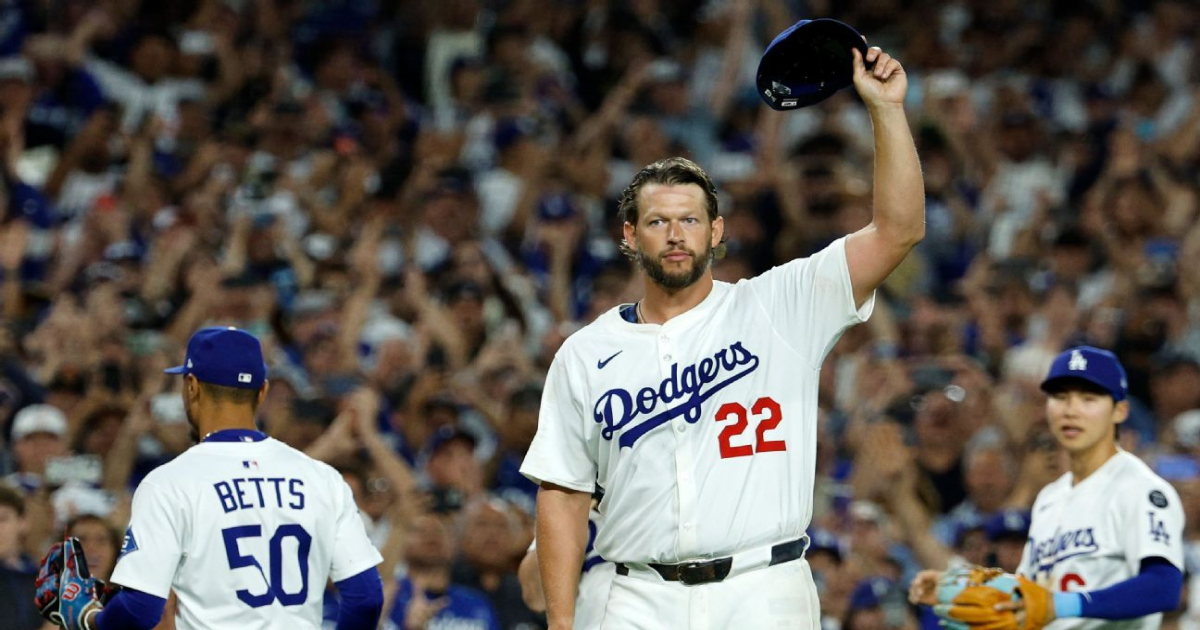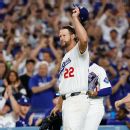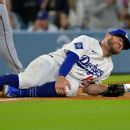LOS ANGELES — On 15 occasions Wednesday, Clayton Kershaw reached two strikes with an opposing hitter and 53,536 Dodger Stadium fans rose to their feet, almost as if to propel their longtime ace to history. They clapped, they yelled, they hoped, and often, in the end, they sighed.
By the time the sixth inning rolled around, Kershaw had accumulated just two strikeouts on the night and 2,999 for his career. It began to feel as if one of the most hallowed milestones in baseball history would happen on the road, away from the people who spent close to two decades stirring with every pitch that came out of Kershaw’s left hand.
And then it happened, at the last possible moment, with two outs in the sixth, on Kershaw’s 100th pitch — a backdoor slider that caught the outside corner, freezing Chicago White Sox third baseman Vinny Capra and making Kershaw the 20th player ever to reach 3,000 strikeouts.
“It’s a little bit harder when you’re trying to strike people out,” Kershaw said after his Los Angeles Dodgers‘ 5-4, come-from-behind victory. “I never really had to do that before.”
The timing of Kershaw’s strikeout — immediately after Max Muncy suffered a gruesome injury to his left knee while applying a tag during an attempted steal of third base — allowed him a moment to savor it. Dodgers fans greeted him with a standing ovation that lasted six minutes, prompting Kershaw to acknowledge them twice. A video tribute played on the scoreboard. His teammates applauded just outside the dugout railing and dispersed hugs.
Later, it was Freddie Freeman — the man who made it a point to remind Kershaw how many strikeouts away he was from 3,000 after every start — who won the game, contributing the walk-off single that capped a three-run ninth inning.
Said Kershaw: “It was an amazing night.”
He later held a champagne flute in the clubhouse and told the players, coaches and trainers who surrounded him that none of his individual accolades — the three Cy Youngs, the MVP, the 10 All-Star Games, the five ERA titles — mean anything without the people to celebrate it with.
Kershaw is just the fourth left-hander to reach 3,000 strikeouts, joining Randy Johnson, Steve Carlton and CC Sabathia. He is one of just three active pitchers, along with Justin Verlander and Max Scherzer, the two who are often lumped with him among the greatest of this generation. And he is one of just five to accumulate that many with one team, along with Walter Johnson, Bob Gibson, Carlton and John Smoltz. Among that group, only Johnson and Gibson ultimately spent an entire career with the same franchise. Kershaw says he will too.
“I don’t know if I put a ton of stock in being with one team early on,” Kershaw said. “It’s just kind of something that happened. Over time, I think as you get older, and you appreciate one organization a little bit more — the Dodgers have stuck with me too. It hasn’t been all roses. I know that. There’s just a lot of mutual respect, I think. I’m super grateful now, looking back. To say that I’ve spent my whole career here and I will spend my whole career here — I have a lot more appreciation for it now.”
Dodgers fans are famously late-arriving, but the vast majority of them had already settled into their seats by the time Kershaw emerged onto the field roughly 30 minutes before he would throw the game’s first pitch. The energy in that moment, Kershaw said, was “palpable,” so much so that even he could not ignore it. Just as stark to him, though, was a “so bad” slider that would not comply. He reached two-strike counts with five of the first six batters he faced and could not put them away because of it.
The first inning lasted 29 pitches — ending with Michael Conforto leaping against the left-field fence to rob a potential three-run homer — and did not include a strikeout. The first did not come until the start of the third inning, when former Dodger Miguel Vargas fell behind in the count 0-2 and swung through a curveball low and away. The next strikeout, Kershaw’s 2,999th, came on his season-high-tying 92nd pitch of the night, a curveball that landed well in front of home plate and induced a swing and miss by Lenyn Sosa to end the fifth inning.
Dodgers manager Dave Roberts did not even look at Kershaw as he made his way back into the dugout, a clear sign that he would not be taken out.
“I was going to give him every opportunity to do it at home,” Roberts said.
PitcherInningsRandy Johnson2,470.2Max Scherzer2,516Pedro Martínez2,647.2Clayton Kershaw2,787.1Nolan Ryan2,802
The reason was obvious at the start of the sixth inning, when a sold-out crowd roared at the sight of Kershaw coming back out. “Something I’ll never forget,” Kershaw said. The first batter, Mike Tauchman, grounded out. Michael A. Taylor followed with a double then banged his helmet against Muncy’s left knee on a headfirst slide, prompting the Dodgers third baseman to be helped off the field with what the team hopes is merely a sprain.
The mood suddenly turned somber at Dodger Stadium. Then, four pitches later, while facing what would have been Kershaw’s last hitter, came elation.
“I would’ve rather just gotten it done in the first,” said Kershaw, whose next start was scheduled for next week in Milwaukee. “But now looking back on that, with us winning the game and the last pitch of the night being the strikeout, I don’t think I would change it.”
Kershaw reached 3,000 strikeouts in 2,787⅓ innings, making him the fourth fastest to reach the mark, according to the Elias Sports Bureau. The only ones who got there with fewer innings were Johnson (2,470⅔), Scherzer (2,516) and Pedro Martinez (2,647⅔). Kershaw’s 2.52 career ERA is the lowest in the live ball era (since 1920) among those with at least 1,500 innings, even though he has nearly doubled that.
He was a force early, averaging 200 innings and 218 strikeouts per season from 2010 to 2019. And he has been a wonder late, finding ways to continually keep opposing lineups in check with his body aching and his fastball down into the high 80s.
Kershaw went on the injured list at least once every year from 2016 to 2024, a stretch in which he was defined just as much for regular-season success as postseason failure. A foot injury made him a spectator last October, when the Dodgers claimed their second championship in five years. The following month, Kershaw underwent surgery to repair a torn meniscus in his left knee and a ruptured plantar plate in his left big toe then re-signed with the Dodgers and joined the rotation in mid-May. He allowed five runs in four innings in his debut but went 4-0 with a 2.08 ERA in his next seven starts, stabilizing a short-handed rotation that remains without Blake Snell, Tyler Glasnow, Roki Sasaki and Tony Gonsolin.
Strikeout No. 1 came against Skip Shumaker, who was recently the manager of the Miami Marlins and now works in the Texas Rangers‘ front office.
Strikeout No. 3,000 came against someone who was drafted 10 years after Kershaw debuted.
The one constant throughout: the fans who so badly wanted to witness history.
“We’ve been through it,” Kershaw said. “We have. I’ve been through it a lot, ups and downs here. More downs than I care to admit. But the fans tonight, it really meant a lot. Usually I try not to acknowledge anything before the game, just because I try to lock it in a little bit. But it was too hard not to tonight. It was overwhelming to feel that. I don’t have a lot of great words other than it was really special.”



